Anyone who works in the credit union movement has experienced a range of successes, challenges, a few unforgettable moments.
But are these experiences intensified even more among cooperative professionals who have spouses or immediate family who also work in the credit union industry?
Do husbands and wives, who are both CEOs with different executive styles, argue when the inevitable dinner time conversations turn to how should they manage problems at the shop?
When a family of CEO executives talk business at family gatherings, do they get looks of boredom and confusion from relatives who know little or nothing about credit unions?
Credit Union Times asked seven families to share their interesting and amusing insights about what life is like when the credit union movement is all in the family.
Read more: Meet the Woods …
 Art Wood and Mary Ott
Art Wood and Mary Ott
Husband-Wife CEOs
At a credit union event in front of dozens of colleagues, Art Wood may have been one of the first credit union CEOs who made a marriage proposal to another CEO, Mary Ott.
They met through the Florida CUES Council. So when Art decided to propose, he thought it would be romantic to “take a knee” at a Florida CUEs Council emergency board meeting. Or at least that's what Mary thought it was before she realized what was really happening, and said yes in a roomful of teary-eyed colleagues.
Hitched in 1998, Art, president/CEO of the $274 million Railroad & Industrial FCU in Tampa and Mary, president/CEO of the $82 million Florida West CU in Brandon, often joke that their marriage works because their cooperatives don't compete for the same members.
“We know many of the same people and have had the same friends and colleagues for so long,” Mary said. “It's very enjoyable because we go to the same meetings, share a lot of work issues and kind of bounce ideas off each other. It works for us.”
They've also learned to respect each other's management style, though sometimes it has generated lively discussions.
“How I get the job done is definitely not the way he would get the job done, but we are both successful,” Mary said.
Art agrees, adding that he has learned to hold his tongue.
“When Mary is managing something and she doesn't ask for my opinion, I don't volunteer it,” Art explained. “That is a hard thing to do. I honestly have learned quite a bit from just observing how Mary does things, and that has helped me professionally.”
Their years of hard work were recognized when they became the first and only couple in credit union history to win the prestigious Buck Levins Award, CUNA's highest honor for political advocacy, in 2013.
“Not in a million years did we ever think we would receive that award,” Mary recalled. “We are really, really proud of that and very happy to do what we can do on behalf of the credit union movement.”
Read more: Meet the Herrings …
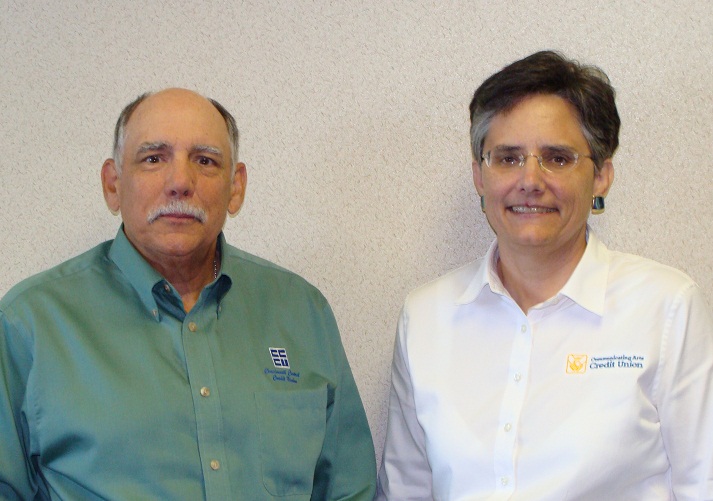 Bill and Catherine Herring
Bill and Catherine Herring
Brother-Sister CEOs
Bill Herring and his sister Catherine Herring had one of the best credit union role models while they were growing up in Cincinnati.
Their mother, Louise McCarren-Herring, was one of the pioneer leaders of the credit union movement who co-founded the Ohio Credit Union League in Columbus. She is also credited with establishing 500 cooperatives.
Because there wasn't always enough money for a hotel room, McCarren-Herring sometimes slept in her car as she was traveling from city to city to organize credit unions, said Bill, president/CEO of the $91 million Cincinnati Central Credit Union.
The funny thing is, Bill and Catherine said they never thought about pursuing credit union careers, even when helping mom with work at cooperatives in their formative years.
Bill was getting ready to graduate college and join the Peace Corps in 1969 when his mom asked him to temporality manage Cincinnati Central CU.
“I said I would do it until my application was processed and accepted at the Peace Corps,” Bill said. “I never made it to the Peace Corp and I'm still here.”
Catherine joined the $58 million Communicating Arts Credit Union in Cincinnati 40 years ago and became its president/CEO in 1987.
“I didn't plan to have a career in credit unions. It just kind of happened,” Catherine reflected. “Mom needed help in the office and I said I would help out, and it just kept going.”
Over the years, brother and sister have collaborated, enabling the Buckeye financial institutions to thrive.
“More than 25 years ago, we both needed new space, so my credit union constructed a building and my sister's credit union agreed to rent space,” Bill said. “We've been in the same building since 1987. We also jointly own a CUSO for data processing systems.”
Additionally, the credit unions share a board room, employee lounge and training facilities.
“We have somewhat different field of membership but there are some areas of overlap,” Bill said. “In the areas we have competition, it's healthy competition and there is certainly nothing wrong with that.”
Catherine agreed.
“I don't think there is any way a credit union our size could have afforded on our own a new Symitar system when we got it back in 1999,” she said. “But by combining resources we were able to get a pretty robust system. We grew up seeing credit unions cooperate with each other. It was just a part of everyday life for us, so it's not anything unusual to have a relationship like this for us.”
Read more: Meet the Harrells …
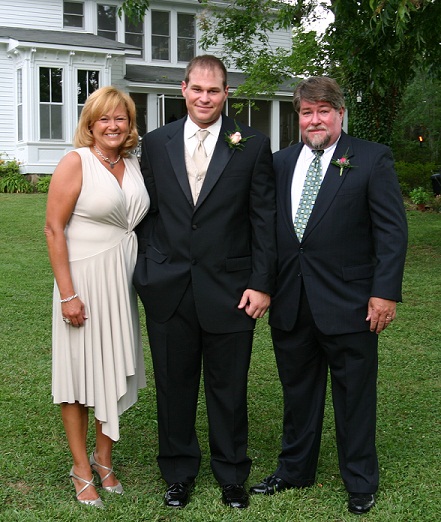 Daphne, Heath and Mike Harrell
Daphne, Heath and Mike Harrell
Mother-Son-Father CEOs
As early as he can remember, Heath Harrell heard his mom and dad, Mike and Daphne, have amusing dinner table conversations about what happened during their daily work at their credit unions.
Mike is president/CEO of the $139 million ACIPCO FCU in Birmingham, Ala., and Daphne is president/CEO of the $88 million Heritage South CU in Sylacauga, Ala.
“It was pretty funny listening to them — and it still is knowing their different management styles — debate about who does what and who is right or wrong,” said Heath, who is president/CEO of the $252 Guardian CU in Montgomery, Ala.
“Sometimes they've tried to draw me into the debates,” he chuckled. “But it's just easier for me not to get involved.”
Mike describes his management style as conservative while Daphne's is just a little bit more liberal.
He recalled discussing whether it was wise move for Daphne to convert then-Avondale Employees Federal Credit Union into a community charter eight years ago. Though the Avondale (textile) Mills had been in operation for more than a century, the company was struggling against crushing international competition. The conventional wisdom, however, was that the company would somehow survive, Mike said.
But Daphne had doubts and decided to apply for a community charter. She also invest in prime real estate next to a busy highway for the credit union's future expansion.
“Daphne, that's crazy. I wouldn't do that,” Mike told his wife. “Of course, she just went on as if she didn't hear what I said.”
About six months after Daphne decided to secure a community charter, Avondale Mills shut down. About 4,000 people lost their jobs.
“If she had listened to me, she would be working for someone else,” Mike said.
He also acknowledged that Daphne has been able to help him see things in a different way, making him a better CEO.
Heath believes growing up in a credit union family helped put his career on the fast track. He became a CEO of Kamala Credit Union when he was only 27, and later facilitated that cooperative's consolidation with Guardian Credit Union, becoming its CEO. Moreover, Heath's wife, Hillary, also broke into the credit union business in 2006 as a part-time consultant for Corporate America Credit Union in Irondale, Ala.
“It's been great having good role models in this industry to help me along,” Heath reflected. “They are a huge resource to me because combined they have over 60 years of experience. Anytime I have ideas, I bounce it off of them and they have been hugely supportive.”
Read more: Meet the Millers …
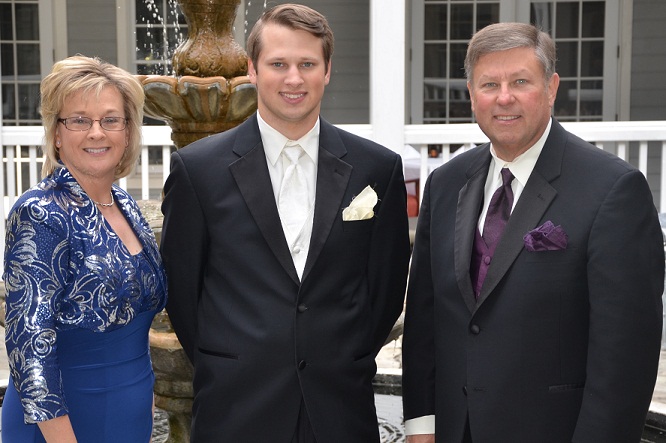 Paula, Ryan and Rick Miller
Paula, Ryan and Rick Miller
Mother-Son-Father CEOs
What's it like having a credit union family when the rest of the extended family doesn't know all that much about credit unions?
Well, it's boring for the rest of the relatives who aren't involved in the industry, laughed Paula Miller, senior vice president for the $398 million Legacy Community FCU in Birmingham, Ala.
“At family gatherings, some relatives would say 'why do you all just want to talk about credit unions,'” Paula said. “Even though we love talking about credit unions, we have to think of other things to talk about.”
Admittedly, Rick Miller, president/CEO of the $27 million Energen Credit Union in Birmingham, Ala., said it's really difficult not to talk about credit union business at family get-togethers.
“You get so caught up in the day-to-day involvement of running things and you don't have a lot of time to sit down and retrospect,” Rick explained. “When you get around other people who do the same thing, then that's a good time to talk shop.”
Sometimes they can't help but talk shop because their son, Ryan, at 22, recently became the president/CEO of the $7.2 million Brassies Credit Union in Anniston, Ala.
So to say the least, Ryan is asking a lot of questions.
“We never encouraged him to go down the credit union path, per se,” said Paula. “But when he finished high school, he started working as a traveling teller for the $595 million Alabama Telco Credit Union in Birmingham, and he really enjoyed it. He's a smart fella and he wants to be in charge. He's working very hard and I am excited he has the opportunity at this age.”
Read more: Meet the Whitties …
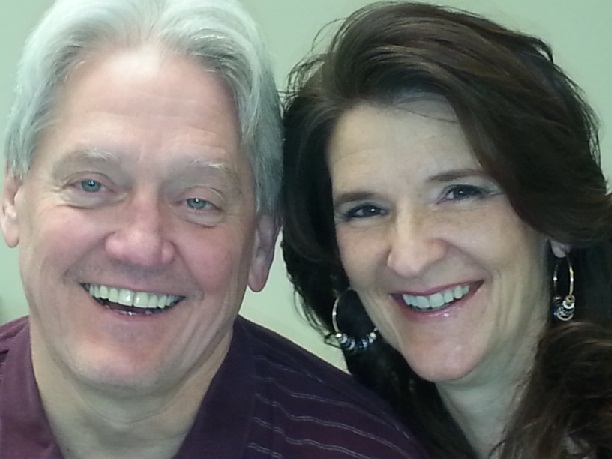 Mike and Deb Whittie
Mike and Deb Whittie
Husband-Wife CEOs
Mike and Deb Whittie at times feel they are perpetually at work, even when they are at home.
Mike is president/CEO of the $18.5 million Federal Employees Credit Union in Des Moines, Iowa, and Deb president/CEO of the $9.3 million Village Credit Union, also in Des Moines.
“We manage two closed fields of membership, so we are not in direct competition with each other and our offices are located about six blocks apart,” Mike said. “That makes life a little easier. I'm not sure what it would be like if we were in competition with each other.”
As CEOs of small credit unions that are facing enormous challenges to stay competitive, Mike and Deb regularly tap into their cooperative spirit by leaning on each other for advice and support.
“As CEOS, we spend our day solving problems and your staff is constantly asking you questions,” he said. “At times, I'll call and ask her a question and she'll call and ask me a question. We tend to be involved with each other's credit union and that can be overwhelming.”
Deb finds being married to a CEO has its advantages.
“If there is something going on I don't know much about, I can talk to him about it,” said Deb. “There have been times we have been behind in our work and we help each other out.”
She started her credit union career path early, at age 14, at the Des Moines Postal Credit Union, now the $65 million First Class Credit Union in West Des Moines, where her dad and mom worked.
There are times, however, when the Whitties don't talk about certain things because they have different management approaches.
“There are some things I don't bring up because I know he doesn't do the things like I do, procedure-wise,” Deb said. “I am a short-cut person and he's not.”
Nonetheless, the differences in management styles are balanced out by a mutual understanding of their challenges in the workplace and the marketplace.
“When things are going bad for me, he understands why things are going bad,” she said. “I get what he is talking about and what his day was like. I think it's beneficial to understand his work as he understands my world as well.”
Read more: Meet the Jaremkos …
 Juliet and Kyle Jaremko
Juliet and Kyle Jaremko
Mother-Son CEO-Business Development Specialist
On snow days, Juliet Jaremko would bring her then elementary school aged son, Kyle, to work at the $12.5 million Fairleigh Dickinson University Federal Credit Union in Madison, N.J., where she launched her credit union credit union career posting payroll entries, and later became a loan officer.
“That was kind of his initiation into the industry,” said Jaremko, president/CEO of the $64 million Automatic Data Processing Federal Credit Union in Roseland, N.J.
Kyle remembers those early days that made a lasting impression on him about money and people.
“It was my real introduction to money and how people managed their money,” Kyle said. “I think it got right into my blood.”
During high school and college summer breaks, Kyle was employed as a credit union teller. He also worked in other departments, helping him build his knowledge about the cooperative business.
Similarly, as Kyle was growing up, Juliet also carved her career path holding various positions. Prior to becoming president/CEO of ADPFCU in 2005, she worked as its credit card coordinator and then as an accountant.
“One of great things about the industry is that it allows you opportunities to gain a lot of knowledge and experience from different areas of the credit union business,” Juliet said.
Jaremko was happy to expand her son's credit union knowledge by sometimes discussing industry news or trends, pointing him to CUNA, the NCUA, and the New Jersey Credit Union League to learn more about what interested most about the credit union movement.
Kyle even enrolled in the same college his mother attended, Bloomsburg University of Pennsylvania. After graduating, he moved to England and earned a master's degree in international business from Sheffield Hallam University in South Yorkshire.
When he returned home, Kyle admits his lifelong exposure to credit unions influenced him to take his first job at ADPFCU as a member development manager. He now works as a business development specialist for the $125 million Jersey Shore FCU in Northfield, N.J.
“It seems that once you're in the credit union industry, you're in it for life,” said Kyle. “But it's great to have someone in the family to bounce ideas off of that may help my credit union.”
Read more: Meet the Blacks …
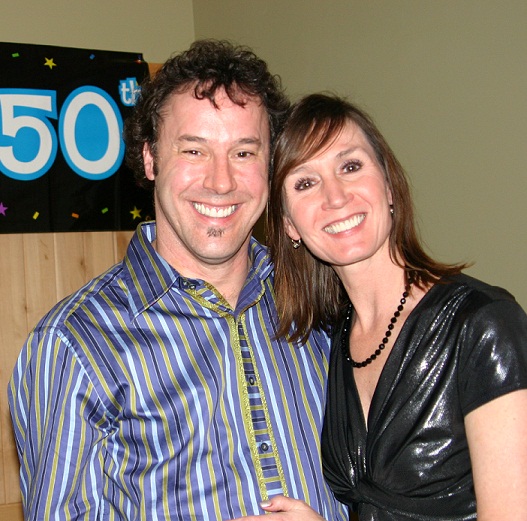 Eddie Black-Tracie Kenyon
Eddie Black-Tracie Kenyon
Husband-Wife CEOs
To have two CEOs under the same roof is both nice and difficult.
That's how the relationship dynamic is described by Eddie Black, president/CEO of the $21.7 million Trico Community FCU in Helena, Mont., and Tracie Kenyon, president/CEO of the Montana Credit Union League, also in Helena.
They met during a CUSO event in Montana and have been married for seven years.
“It's nice to have someone who understands your (CEO) life,” Black said. “My second NCUA exam was scheduled during our vacation. Though I tried to reschedule it, Tracie understood completely that I had to be at the credit union, so we postponed our vacation.”
Kenyon agreed with her husband, but added that there are times it's difficult when she and her husband are privy to information that they cannot share or talk about.
“There are times we have gotten to the point where we can't have certain conversations,” Kenyon said. “Thankfully, in our relationship there is a high degree of respect and trust both as people and as professionals.”
That difficulty, however, is balanced by the fact that the couple shares many of the same colleagues, making their social and professional lives all that more enjoyable.
“The MCUL annual meeting is really a celebration of our friendships with our credit union colleagues from across the state and that makes it fun,” Black explained. “There are times when Tracie has to attend a dinner with one of her members, and when I get to attend as well, we've never had to deal with any awkward spouse moments.”
© Touchpoint Markets, All Rights Reserved. Request academic re-use from www.copyright.com. All other uses, submit a request to [email protected]. For more inforrmation visit Asset & Logo Licensing.







